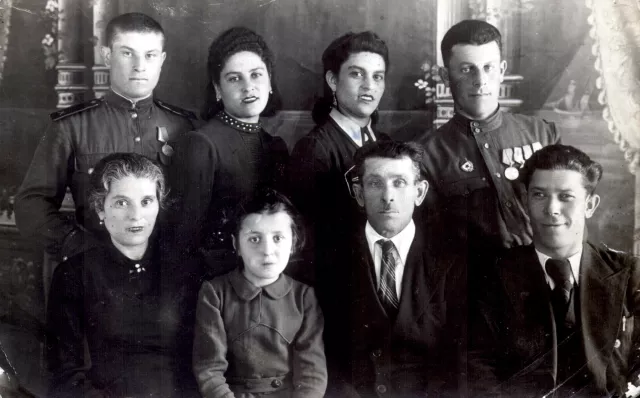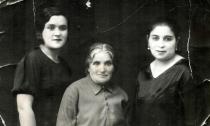This is me with my mother Beila Uchitel and my relatives. This photo was taken in Rybnitsa in 1945. Sitting from left to right: my mother Beila Uchitel, I, my stepfather Shabs Uchitel, my stepfather's older son Lyonia Uchitel. Standing from left to right: my stepfather's younger son Senia Uchitel, Tamara Trostianetskaya, my mother's niece, Pesia Trostianetskaya, my mother's niece, Itzyk-Moisha Trostianetskiy, my mother's nephew. His photograph was taken on the occasion of Lyonia Uchitel visiting from Moscow.
In 1944 mother and I arrived in Rybnitsa from evacuation. Mama went to work at the tailor's shop. In 1945 mama was 40 and she was very attractive. Our relatives began to look for a match for her.
They arranged for mama to meet Shabs Uchitel from Rybnitsa. At the beginning of the war Shabs, his wife and their sons Senia and Boria were taken to the ghetto. Later they were taken to the terrible camp in Varvarovka [Nikolayev region, in Transnistria]. They escaped one night from there. Guards with dogs were chasing after them. They managed to get to Moldavia where a Moldavian family gave them shelter some place in the vicinity of Rybnitsa. Then they returned to the ghetto on their own. When the Soviet troops liberated Rybnitsa, Boria and Senia were taken to the army. Boria was wounded and taken to the hospital. When Shabs' wife heard that her son was wounded, her heart failed her - she suffered from heart problems - and she died.
Mama and Shabs got married in 1945. Few years later Shabs adopted me, and I adopted his surname - Uchitel. He was good to me, but if this happened now, I would rather keep my father's surname. We rented an apartment. We were poor, but mama tried to observe Jewish traditions. Mama's relatives joined us on Pesach. I remember the first Pesach celebrations in Rybnitsa were interesting. Mama had special crockery for Pesach. She had her own recipe to make keyzele. She made matzah observing the proportion between flour and water. Two-three women got together to make matzah at home. Later the synagogue began to make matzah and mama made an order for matzah in January. There is a mourning day before Rosh Hashanah. Mama went to the grave of her father David Trostianetskiy in Rezina on this day. Mama fasted on Yom Kippur.
I went to the second form at school, but I didn't know or understand anything. A week later I was assigned to the first form where there were other overgrown children studying, according to my birth certificate, I was born in 1933. I remember that my classmates were big boys and girls. I was the youngest and the tiniest one. I was told to sit at the first desk. We were studying multiplication by 'three' and the teacher asked: 'How much is 3 multiplied by 5?' I raised my hand and said: '3 x 5 is 15, and 15 divided by 5 is 3'. 'Look, a little body often harbors a great soul!' - somebody exclaimed from the rear. So I excelled at the very beginning. Later bigger children went to study in an evening school [secondary schools for working young people in the USSR]. I caught up other children in my class soon. I studied well. I was particularly good at mathematic. I also attended an embroidery and a dancing groups in the house of pioneers [pioneer club]. I liked dancing. I took an active part in school activities.


















